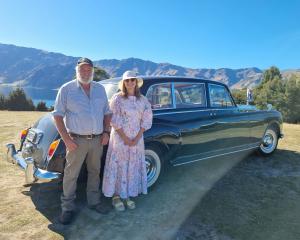
For several hours on Tuesday morning, passersby had the opportunity to get an up-close look at the two Otago Southland Rescue Helicopters parked on the lawn next to the Wānaka Hotel while their crew members attended a mountain rescue workshop at the Lake Wānaka Centre.
Helicopters Otago Limited operates the Otago Southland Rescue Helicopter service. General manager Graeme Gale said there was a practical reason for such a unique landing.
“We’re operational. If there’s an emergency on the go, we’re gone.”
More than 160 alpine rescue practitioners from throughout the country were in town for the day-long event, organised by the Department of Conservation’s Aoraki Mt Cook Alpine Rescue Team, New Zealand Search and Rescue (NZSAR) and the Land Safety

that took place in Wānaka on Wednesday and Thursday.
Doc’s Aoraki Mt Cook Alpine Rescue team leader David Lewis, one of the organisers of the workshop, said there had been a push to run a mountain rescue workshop in the build-up to the conference since 2019, taking advantage of the fact so many practitioners would be in the same location at once.
“Trying to get everyone in the same room is a bit of a challenge.”

Mr Lewis said the workshop was an opportunity for practitioners to "put the names to faces" and provide them with a greater appreciation of the skills and capabilities of their colleagues.
"We’ve just really tried to step it up this year and sort of showcase some new ideas, some new equipment.
"It’s nice to see a big wide range of people here this time."

Lionel Clay, one of the team leaders at the Wānaka Alpine Cliff Rescue Team, said the workshop’s "very friendly and informal" nature made it the perfect place for networking.
"To have the tasking authorities here, the rescue co-ordination centre and the police, who send us out on the jobs ... for us to be able to brief them on what we’re dealing with on rescue jobs, what goes well, what doesn’t ... it’s a great environment."
He said it was difficult to overstate the value of having such an experienced team of rescuers on call at all hours in Wānaka, all of whom were volunteers.
"Every single one of us. It’s the Kiwi way."












